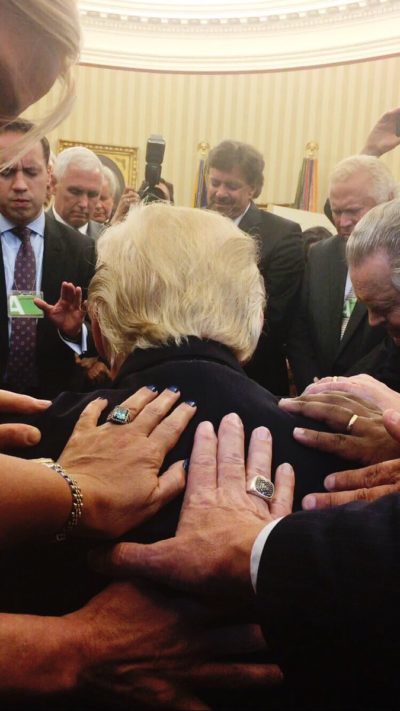Julia Duin, who has a long history of stellar religion writing, yesterday published at Politico a deep dive into the world of Trump prophets and prophecies. I urge you to take the time to read it. The business of the charismatic church right now is in disarray because the prophets can’t get their prophecies straight. Some think Trump is about to return to the throne and others think those prophets are foolish.
I am not very bothered by this. I have never had much confidence in modern day prophets. Although I think some of them are good guessers, I doubt any of them have an inside line on God’s will. They all wanted Trump to win so badly that they groupthought their way into near unanimous predictions of a Trump landslide. They were listening to each other, not God or the majority of Americans who were fed up with the Narcissist in Chief.
Some like Jeremiah Johnson can admit this, but others like Johnny Enlow and Greg Locke are providing evidence for cognitive dissonance theorists. The key source for understanding reaction to prophecy discomfirmation is Leon Festinger’s book, When Prophecy Fails. Festinger and his co-authors describe the distress true believers experience when their prophecies fail. I can also recommend in Religion Dispatches a nice summary of more recent work of prophecy disconfirmation which provides a fuller account of the bizarre reactions to prediction failure.
Magnitude of the Dissonance
Let me share a short portion from When Prophecy Fails:
Theoretically, what is the situation of the individual believer
at the pre-disconfirmation stage of such a movement? He has a
strongly held belief in a prediction – for example, that Christ will return -a belief that is supported by the other members of the movement. By way of preparation for the predicted event, he has engaged in many activities that are entirely consistent with his belief. In other words, most of the relations among relevant cognitions are, at this point, consonant.Now what is the effect of the disconfirmation, of the unequivocal fact that the prediction was wrong, upon the believer? The disconfirmation introduces an important and painful dissonance. The fact that the predicted events did not occur is dissonant with continuing to believe both the prediction and the remainder of the ideology of which the prediction was the central item. The failure of the prediction is also dissonant with all the actions that the believer took in preparation for its fulfillment. The magnitude of the dissonance will, of course, depend on the importance of the belief to the individual and on the magnitude of his preparatory activity.
In the type of movement we have discussed, the central belief
and its accompanying ideology are usually of crucial importance in the believers’ lives and hence the dissonance is very strong and very painful to tolerate.
Festinger predicts that the magnitude of the dissonance generated by prophecy disconfirmation will hinge on the importance of the belief to the individual. He says the person’s central belief and accompanying ideology are of crucial importance. As is very obvious for all to see, the dissonance for the Trump prophets is “very strong and very painful to tolerate.” For Trump prophets, it appears that their central ideology is about Trump being in charge. Instead of Christ, they have put their trust in Trump.
The focus on Trump at all costs is what is so frustrating to other charismatics like Michael Brown. Brown and some others are forming a rival group of prophets who know the election is over and, despite their apparent belief in predicting other futures, are trying to keep some real in reality. From Duin’s Politico article:
In a December 15 article, Michael Brown, a longtime charismatic revivalist and scholar in Charlotte, North Carolina, had sharp words, warning co-religionists: “There is no reality in which Trump actually did win but in fact didn’t win. … To entertain possibilities like this is to mock the integrity of prophecy and to make us charismatics look like total fools.”
In his interview with Duin, Brown seems to describe well the primary ideology held by the Trump prophets:
“How did we become so politicized?” he wonders. “How did so many of us end up with an almost a cultlike devotion to a leader, compromise our ethics for a seat at the table and drape the Gospel in an American flag?”
Actually, Brown should know the answer to this in that he often defended Trump against criticism during his term. However, he now sees accurately the result. Reality is here. Trump lost. For some, however, Trump became so integral to their religion that they can’t quit him. They can’t see reality without him. The dissonance is to great. To recognize Trump’s loss might do damage to their faith in God.
At some point very soon, there will be a final disconfirmation. Some will go quietly. Some will accept reality. Some will blame the Satanic forces of their ideological opponents. While I doubt any of these public preachers will give up the gravy train of their ministry, many every day Christians who have been hoodwinked by these false prophets might indeed resolve the dissonance by deciding that none of that god stuff was ever true and become another casualty of the Trumpvangelical transformation.
